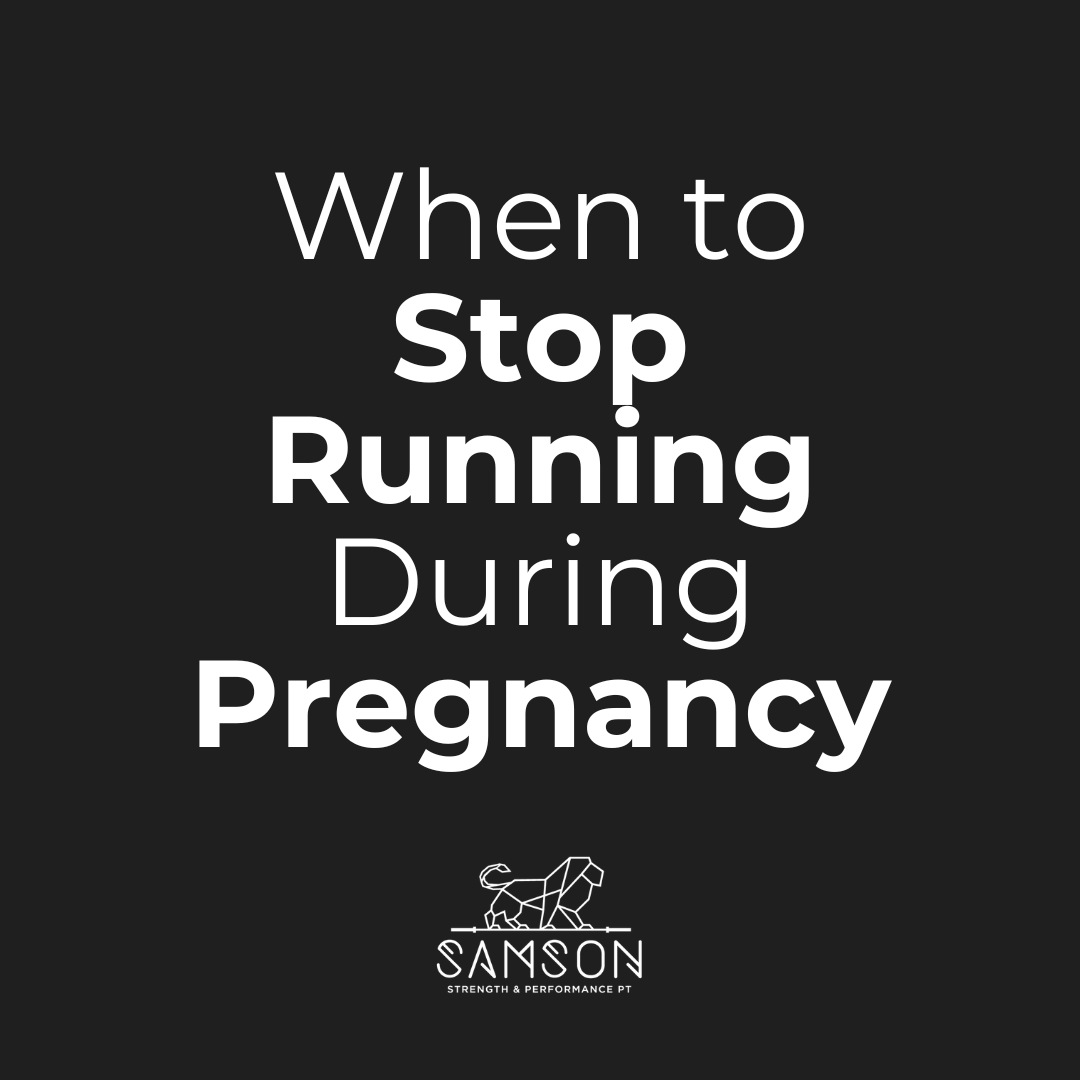When to Stop Running During Pregnancy: A Research-Based Guide
When to Stop Running During Pregnancy? A Research-Based Guide
Running is a popular form of exercise that many people enjoy, and for pregnant women, it can be a beneficial way to maintain physical health and mental well-being.
However, as pregnancy progresses, the question of when to stop running during pregnancy can arise.
We will go over research from the last decade to answer that question, providing insights into the safe guidelines and considerations for pregnant runners.
The Benefits of Running During Pregnancy
Before diving into the question of when to stop running, it’s important to understand the benefits that running (and exercise in general) can offer during pregnancy.
Multiple studies have shown that moderate-intensity exercise, like running, can help with weight management, reduce the risk of gestational diabetes, improve cardiovascular health, and alleviate pregnancy-related discomforts such as back pain and swelling.
A study published in The American Journal of Obstetrics and Gynecology (2014) suggests that women who engage in regular physical activity during pregnancy have lower risks of preeclampsia, gestational hypertension, and excessive weight gain.
Additionally, exercise has been linked to better mental health during pregnancy, reducing symptoms of anxiety and depression.
However, while the benefits are clear, there are also risks that should be considered. Therefore, understanding when to stop running during pregnancy is key to ensuring the safety of both momma and baby.
Key Research Findings on Running During Pregnancy
Key findings suggest these important cues during each trimester of your pregnancy:
First Trimester: Listen to your body
Second Trimester: Adjust to physical changes
Third Trimester: The point of caution
We will go into more detail on each of these findings below.
The First Trimester: Listen to Your Body
The first trimester is a time of rapid physical changes, and while many women continue to run without issues, it's crucial to be mindful of early pregnancy symptoms such as fatigue, nausea, and hormonal changes. According to a study published in Medicine and Science in Sports and Exercise (2016), many pregnant women experience increased fatigue in the early stages, which may make running more challenging.
However, if a woman has been running regularly before pregnancy, moderate running during the first trimester is typically safe, as long as there are no complications. The key, as recommended by the American College of Obstetricians and Gynecologists (ACOG), is to stay hydrated, avoid overheating, and modify intensity to suit how the body feels.
If you experience severe fatigue, dizziness, or spotting, it’s important to consult a healthcare provider. Also, if a woman is new to running or has a high-risk pregnancy, it might be better to focus on lower-impact exercises like walking or swimming.
The Second Trimester: Adjust to Physical Changes
As the pregnancy progresses into the second trimester, the body undergoes significant changes, including an expanding belly and shifting center of gravity. For many women, this is a time when running might still feel comfortable, and some may even feel more energetic than in the first trimester.
Research in Current Sports Medicine Reports (2017) suggests that the second trimester is generally considered the safest period for running during pregnancy, as long as there are no complications. The body is typically more accustomed to the pregnancy changes, and the risk of miscarriage has decreased. However, as the belly grows, running may become more difficult due to the physical discomfort of a larger abdomen and potential pelvic instability.
To continue running safely during this time, pregnant women should focus on proper posture, wear supportive footwear, and consider decreasing intensity or pace. Many women also find that modifying their running form, such as shortening their stride, helps avoid stress on the joints.
The Third Trimester: The Point of Caution
As pregnancy reaches the third trimester, running may become more challenging and uncomfortable. The growing belly and additional weight gain increase the impact on joints and ligaments, and the body's energy reserves are often lower as it prepares for labor.
According to a study published in Sports Medicine (2018), while running during the third trimester may still be safe for some women, the risk of injury increases, and the benefits of continuing running are often outweighed by the discomfort it may cause.
The physical stress on the body—combined with changes like increased blood volume, shifts in balance, and potential pelvic floor issues—can make running increasingly difficult.
For many women, this is the point at which they may choose to switch to lower-impact activities, such as walking, swimming, or cycling, to continue staying active while minimizing risk.
If a pregnant runner experiences symptoms such as dizziness, shortness of breath, sharp abdominal pain, or swelling in the legs or feet, it’s important to stop running immediately and consult a healthcare provider. These could be signs of complications that need medical attention.
Red Flags: When to Stop Running
While exercise can be beneficial throughout pregnancy, there are specific red flags where running should stop altogether. These include:
Shortness of breath at rest or during activity
Dizziness or fainting
Chest pain or irregular heartbeat
Vaginal bleeding or spotting
Severe swelling of the legs or hands
Severe abdominal pain or cramping
Loss of fetal movement or signs of preterm labor
A study from The Journal of Physical Activity and Health (2015) stresses the importance of listening to your body and being aware of warning signs during exercise. If any of these symptoms occur, it’s critical to stop running immediately and seek medical attention.
Expert Recommendations
The American College of Obstetricians and Gynecologists (ACOG) provides a few guidelines for pregnant women who wish to continue running or engaging in vigorous physical activity:
Consult with Your Healthcare Provider: Before continuing or starting a running routine during pregnancy, it’s always advisable to consult with your obstetrician or midwife to ensure that you are healthy enough for exercise and to assess any risks or complications.
Modify as Needed: Pregnancy is a time of physical change, and what feels comfortable early on may not be suitable as the pregnancy progresses. Modifying your running routine—whether it’s adjusting pace, distance, or switching to alternative activities—can help ensure safety.
Monitor Hydration and Temperature: During pregnancy, staying hydrated and avoiding overheating are critical. Pregnant women should avoid running in hot, humid environments, especially during the later stages of pregnancy.
Know When to Transition: While it’s generally safe for many women to continue running into the second trimester, most experts recommend transitioning to lower-impact exercises in the third trimester to reduce strain on the body.
Conclusion
Running during pregnancy can be an excellent way to stay healthy and manage physical and emotional well-being, but it requires careful attention and modification as the pregnancy progresses.
While each pregnancy is unique, the research from the last decade suggests that women can continue running safely during the first and second trimesters with proper precautions.
By the third trimester, however, the risks typically outweigh the benefits for most women, and lower-impact activities may be a better option.
As always, listen to your body and consult your healthcare provider before continuing or starting any exercise program during pregnancy. With the right precautions and awareness, pregnant runners can continue to enjoy the benefits of physical activity while prioritizing their health and the health of their baby.
Need help preparing for a birth in Jacksonville Beach, FL?
If you’re looking for personalized, one-on-one pelvic floor sessions to address your pelvic health concerns, we provide pelvic health physical therapy services to women in the Jacksonville Beach area.
If you’re looking for providers who will listen to you and help you get to the root cause of your pelvic floor concerns, we’ve got you. We’re here to help you if you’re experiencing pelvic pain, pelvic heaviness, leaking, or are pregnant/postpartum and want to continue safely working out/running/lifting during your pregnancy and get back to your sport after birth.
Get started today by booking a discovery call.

